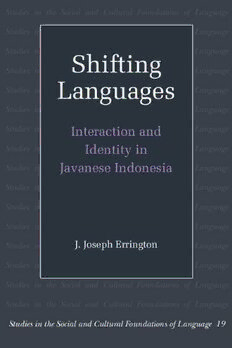
Shifting Languages PDF
Preview Shifting Languages
Indonesian is the national language of a vast, plural nationstate, the world’sfourthlargestcountrywithapopulationofmorethan200million people. Local minority languages are rapidly being displaced by Indone sian, and it is predicted that by 2020 roughly 70 percent of the projected population of 260 million will be Indonesianspeaking. This growth, unprecedented in the developing world, is largely due to the forceful presence of state institutions which use, promote, and disseminate a languagefirstintroduced bythe Dutchcolonialrulers.JosephErrington’s third book on language in Indonesia is a detailed analysis of ‘‘shifting languages’’intwosmallJavanesecommunities.Akeyfigureinthisareaof research, he examines changing conversational practices in relation to questions of ethnicity, nationalism, and political culture. The theoretical observations have implications beyond the two villages for other parts of Indonesia,SoutheastAsia,andforthedevelopingworldingeneral. is the author of two books on language and social change in Java, and numerous articles. He is Professor of Anthropology andEastAsianLanguagesandLiteraturesatYaleUniversity. Thisseriesrepresentstheconcernsofscholarsintheanthropologyandsociology oflanguage,sociolinguistics,andsociallyandculturallyinformedpsycholinguis tics. Its aim is to develop theoretical perspectives on the social and cultural character of language by methodological and empirical emphasis on the occur rence of language in its communicative and interactional settings, on the socio culturallygrounded‘‘meanings’’and‘‘functions’’oflinguisticforms,andonthe social scientific study of language use across cultures. Exploring the essentially ethnographic nature of linguistic data and language practices, the approaches may be synchronic or diachronic, normative or variational, spontaneously occurringorinducedbyaninvestigator.Thebooksintheseriesmakesubstantive andtheoreticalcontributionstodebatesoverthenatureoflanguage’sembedded ness in social and cultural life, and over the role of language in sociocultural systems. Editors JudithIrvine BrandeisUniversity BambiSchieffelin NewYorkUniversity Editorialboard MarjorieHarnessGoodwin UniversityofSouthCarolina JoelKuipers GeorgeWashingtonUniversity DonKulick StockholmsUniversitet JohnLucy UniversityofChicago ElinorOchs UniversityofCalifornia,LosAngeles MichaelSilverstein UniversityofChicago Alistofbooksintheseriescanbefoundaftertheindex. SHIFTING LANGUAGES INTERACTION AND IDENTITY IN JAVANESE INDONESIA J. JOSEPH ERRINGTON ThePittBuilding,TrumpingtonStreet,CambridgeCB21RP,UnitedKingdom TheEdinburghBuilding,Cambridge,CB22RU,UnitedKingdom http://www.cup.cam.ac.uk 40West20thStreet,NewYork,NY10011 4211,USA http://www.cup.org 10StamfordRoad,Oakleigh,Melbourne3166,Australia #J.JosephErrington1998 Thisbookisincopyright.Subjecttostatutoryexceptionandtotheprovisionsofrelevant collectivelicensingagreements,noreproductionofanypartmaytakeplacewithoutthe writtenpermissionofCambridgeUniversityPress. Firstpublished1998 PrintedintheUnitedKingdomattheUniversityPress,Cambridge Typesetin10/12ptTimes AcataloguerecordforthisbookisavailablefromtheBritishLibrary LibraryofCongressCataloginginPublicationdata Errington,JamesJoseph,1951 Shiftinglanguages:interactionandidentityinJavaneseIndonesia/J.JosephErrington; [editors,JudithIrvine,BambiSchieffelin]. p. cm. (Studiesinthesocialandculturalfoundationsoflanguage) ISBN0521632676(hardbound). ISBN0521634482(pbk.) 1.Javaneselanguage Socialaspects. 2.Speechandsocialstatus Indonesia Java. 3.Java(Indonesia) Sociallifeandcustoms. 4.Linguisticchange. I.Irvine,JudithT. II.Schieffelin,BambiB. III.Title. IV.Series. PL5161.E778 1998 499’.222 dc21 98 20577 CIP ISBN0521632676hardback ISBN0521634482paperback CONTENTS Listoffigures,maps,andtables page viii Acknowledgements ix Preface:suggestionsforuse xi Noteonorthographyandtranscription xiii 1 Introduction 1 2 Acity,twohamlets,andthestate 16 3 Speechstyles,hierarchy,andcommunity 35 4 Nationaldevelopment,nationallanguage 51 5 Publiclanguageandauthority 65 6 Interactionalandreferentialidentities 82 7 Languagecontactandlanguagesalad 98 8 Speechmodeling 117 9 Shiftingstylesandmodelingthought 139 10 Javanese Indonesiancodeswitching 155 11 Shiftingperspectives 184 Notes 195 Workscited 202 IndexofJavaneseandIndonesianwords 210 Generalindex 213 vii FIGURES, MAPS, AND TABLES Figures 3.1 Genericmarkednessrelationsbetweenspeechstyles page 39 3.2 Structuralrelationsbetweenstylesofba´sa´ 40 3.3 Traditionalexemplaryrepertoire/use 41 3.4 ContemporaryconservativeeliteJavaneseuse 44 3.5 Contemporaryurban/villageusage 46 Maps 1 TheIndonesianarchipelago xvi 2 EasternCentralJava xvii Tables 3.1 ExamplesofJavaneseaddressstyles 37 3.2 Changingusesofpolitesecond-personpronouns 49 6.1 Changingpatternsofkintermuse 84 6.2 Indonesianpersonalpronounparadigms 93 6.3 Javanesevs.Indonesianpersonalpronounusage 97 7.1 ComplementaryJavanese/Indonesianusage 113 7.2 Listofelementsintext7.1 114 viii ACKNOWLEDGEMENTS Research on which this book is primarily based was carried out in 1985 and 1986 with intellectual, financial, and institutional support from numerous organizations and people. For financial support I am grateful to the National Science Foundation, the Social Science Research Council, and the Wenner Gren Foundation; I also owe thanks for a Junior Faculty Fellowship from Yale University for the 1985 86 aca- demic year. The Indonesian Academy of Sciences (Lembaga Ilmu Pengetahuan Indonesia) and Sanata Dharma University also gave me crucialinstitutionalsupport.Toalltheseorganizations,andespeciallyto Rama Danu, my sincere gratitude. None is responsible for this book’s contents. If there has been any benefit to the slowness with which this work has gestated, it has been the chance to interact with other scholars in ways whichhaveshapeditdirectlyandindirectlyovertenyearsorso.Icannot refrain from mentioning some of these. In 1988, support from a Yale Senior Faculty Fellowship made possible a six-month residence at the Center for Psychosocial Studies in Chicago. Then and since, I have continually benefited from animated discussions involving members of several of the Center’s working groups. I hope the influence of those contacts is as apparent to them as it is to me; I owe thanks to Barney Weissbourd,BenLee,andGregUrban. Thanksforinspirationandsupportivecriticismareduetomembersof the Center’s working group on language ideologies, including Dick Bauman, Sue Gal, Jane Hill, Judy Irvine, Ben Lee, Bambi Schieffelin, Jacquie Urla, and Kit Woolard. I am grateful also to persons who responded to material which I presented first in a variety of venues, en routetothiswriting:attheUniversityofPennsylvania,theUniversityof Wisconsin, the University of Arizona, Yale University, and Harvard University, various conference panels, and the 1995 meeting of the SoutheastAsianLinguisticsSociety.Inaddition,Iowe sincerethanksto Alton Becker, Joel Kuipers, and Kit Woolard, as well as anonymous reviewers who made the heroic effort of reading all or parts of previous drafts. ix x Acknowledgements Some things never seem to end, including (it seems) my engagement with people in south-central Java. So my debt of thanks to them shows no signs of diminishing. I did not know when I met her in 1986 that I wouldhaveMbakTinukasacompanionnow,asthen;herhelpwiththe drudgeryofresearchthenwasinvaluable,andhergraciouspresenceover the years since has helped me to feel that my writing has not become totallyremotefromtheJavaneselanguageorpeople.Iowenolesstothe personswhoworkedandconsultedwithmeduringtheresearch.Icannot help but extend thanks specifically to Mas Dib, Pak Hari, Mas Poino, PakWanda,andMbakEndhangfortheirinterestandhelp. My village hosts, who never made me feel like the encumbrance I surely often was, showed a graciousness and patience which I remember fondly and with gratitude. Their willingness to accept me as a visitor made it possible; my memory of that acceptance has sometimes been an impetusforseeing it throughas best Ican.So tooI owe much topeople in Java I was unable to meet, but whose voices have lingered in my memory as their words have entered this text. For better or worse, all of these people deserve credit for whatever value this book has, and certainly none of the blame for its inadequacies. Nyuwun pangapunten saderengipun.
